Tech Sergeant Nathaniel Parry [Moderator]: So, first off, thank you, Secretary, for joining us here today at the Defense Media Activities Studios here in Fort Meade, Maryland. It is a pleasure having you.
SecDef Ashton B. Carter: Great being here, Nathan. Appreciate the opportunity.
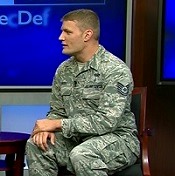 Moderator Parry: Well, I think we
all appreciate the opportunity to have this one on one situation
talking with you. You're the -- You are the leader of the Department of Defense,
and you've been in this position for about six months. Could you
tell us what your top priority is?
Moderator Parry: Well, I think we
all appreciate the opportunity to have this one on one situation
talking with you. You're the -- You are the leader of the Department of Defense,
and you've been in this position for about six months. Could you
tell us what your top priority is?
SecDef Carter: Oh, by far and away it's -- it's you. It's the troops. That's what I wake up for every morning. That's what I wake up to every morning. First and foremost, those who are in harm's way, and making sure that we area taking the utmost care in how they're employed, and taking, making sure that they're fully ready and trained. And then for the Force as a whole, deployment and...employment, job one. Greatest care, making sure we only use you when we have to, and that we've thought through what the consequences of doing that will be. And then for everybody else and their families, their welfare, their dignity, that we're taking good care of them -- during their service, and then of course after service. So, that's what Stephanie, my wife and I -- it's the troops. That's what we wake up to every morning.
Moderator Parry: Well, you are a very person -- very busy person, but you've made time to take with some of the service members. In just this last week, you went to Illinois, Nevada, and California. Could you talk a little bit about what you did there and what you saw?
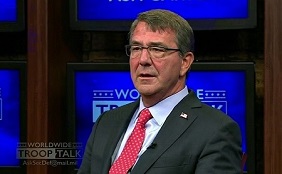 SecDef Carter: Sure. Well,
it's -- it's good -- you know, I ask our people to think outside the five-sided box of
the Pentagon, and it's important that I get outside the five-sided
box, also. So, I was out -- first of all, at
Scott [Air
Force Base], where
TRANSCOM is.
TRANSCOM doesn't get a lot of attention, but nothing is possible,
none of our effectiveness of our Force without the mobility that they
provide. We -- We had a change of command, brand new guy,
[General] Darren McDew,
super guy, taking the place of his predecessor [General
Paul J. Selva], whom I asked to be
the Vice Chairman of the Joint Chiefs of Staff. We have a whole
bunch of new chiefs, by the way.
SecDef Carter: Sure. Well,
it's -- it's good -- you know, I ask our people to think outside the five-sided box of
the Pentagon, and it's important that I get outside the five-sided
box, also. So, I was out -- first of all, at
Scott [Air
Force Base], where
TRANSCOM is.
TRANSCOM doesn't get a lot of attention, but nothing is possible,
none of our effectiveness of our Force without the mobility that they
provide. We -- We had a change of command, brand new guy,
[General] Darren McDew,
super guy, taking the place of his predecessor [General
Paul J. Selva], whom I asked to be
the Vice Chairman of the Joint Chiefs of Staff. We have a whole
bunch of new chiefs, by the way.
Then on to, first, Nellis [Air Force Base]. And -- And Nellis is a place where you see, Nathan, the transition that we're undergoing strategically from our -- our focus, which we had to have on Iraq and Afghanistan for 14 years or so and where I think our performance was outstanding; but it was all consuming. And now, we're refocusing on full-spectrum conflict and the whole range of...emergencies that we may need to respond to, and that's what they're doing at Nellis. They're practicing against high-end threats and...new technologies, cyberspace, integrating them with air operations.
Then onto [Camp] Pendleton for the Marines, same thing. Marines were focused on counter-insurgency; now going back to their roots: maritime operations, amphibious operations, rapid response, and so with absolutely fantastic folks out there. And then to Silicon Valley, and that's worth noting because one of things that makes our military the finest fighting Force the world has ever known, next to our people -- our people is what makes it the finest fighting Force -- next to that is the tradition of great American technology applied to warfare. And that's something that we need to keep up, and so we need to stay connected to the tech community. Silicon Valley is just one hub around our country.
And I'm trying to build bridges to those folks. Some of them don't know us, because remember only a small slice of our society these days serves. And so I'm trying to connect us to them, so that we have their best ideas and their best technology, so that my successor as the Secretary of Defense and your successors in the troops have the very best technology. So it was great. It was a great trip and it kind of illustrated everything that we have on our minds now in this era in our defense.
Moderator Parry: Well, sir, you've had the opportunity to talk and engage with a lot of the Force now. What do you have to think -- or what do you think about the Force of the future?
SecDef Carter: Sure. Well, it's worth thinking about the Force of the future and -- and the way I think about it is this: This -- You are the finest. All the people watching all around the world, those of you sitting in front of me, you are the finest fighting Force the world has ever known. That's a gift that I inherited from my predecessors and from the generations before me. That's something I want to make sure that my successor and my successor's successor and so forth all have. And that means thinking ahead to how new generations think and what they're like. What we're learning about how to manage people and give them opportunities, you know, people don't want to have their careers in the same way as in the past. Family's important, mobility's important, home is important, learning, staying up, staying current, staying trained in new skills, transition’s important.
So there are a whole lot of things that are part of what the world will look like in the future, and so I want us to make sure that as we think about the force of the future, we're using the best of new techniques and new thinking, and challenging ourselves to say, "What's is going to take to have a room full of people as good as you 10 years from now, 20 years from now, 30 years from now." That's what the Force of the future is about. I've gotten a whole lot of ideas. We're going to sift through them. You know, I -- some of them -- ideas that are being employed in civilian life -- military life will never be like civilian life. There's -- Military life is the profession of arms, so it's different. That doesn't mean we can't learn things, though, from what other people are doing around society. And we don't need to look up and look around and be aware. That's what I mean by the force of the future: to have something as fine in the future as what is represented before us right here.
Moderator Parry: All right. Well, thank you, sir. I -- I don't want to take up all of your time. We have an audience of about 100 people here. I'm sure they have questions for you. And for you watching at home, I'm sure you have a question as well. So we're going to head out to our social-media team, where Petty Officer Laurie Bent is going to tell you how you can join this conversation.
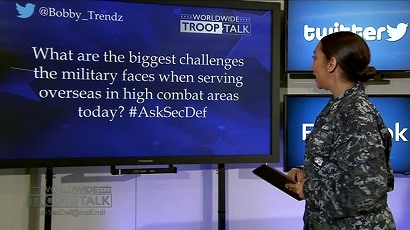
Petty Officer Laurie Bent [Moderator]: Well, Twitter has been buzzing all morning. Our service members around the world have been dropping their questions there using the hashtag asksecdef. And our first question is coming from Bobby Trendz. His question is, Secretary, "What are the biggest challenges the military faces when serving overseas in high-combat areas today"?
SecDef Carter: Well, there are a couple. I mean, first and foremost is their effectiveness, which means they need to get really good training and be -- only be deployed when they're fully ready. Then when they're there, their effectiveness and also Force protection -- taking care of our people overseas, making sure that they're protected. And then, of course, they leave families back behind, and so their connection to their families, their ability to communicate with their families, and making sure that the rest of their lives is still possible even while they're doing what is the noblest thing you can possibly do, which is defend our country and make a better future for our children.
Moderator Parry: Well, that came -- that was a great question that came from Twitter, and you too can ask a question on Twitter. Just make sure you use the hashtag asksecdef. Or you can go out to his Facebook page. Make sure you like1 the Secretary of Defense. It's Facebook.com/secdef. And there, too, you can ask your question, where we'll answer it here live during the first-ever Worldwide Troop Talk with the Secretary of Defense. And this is worldwide here, Secretary. In fact, we're going to take you out to Europe for your next question. Laurie?
Moderator Bent: We're actually headed to Kaiserslautern, Germany, where we're going to talk to Senior Airman Shabree Heasell. Are you -- can you hear me?
SecDef Carter: There we are.
Moderator Bent: Hi. Welcome.
Airman Heasell: – Yes ma’am, I can hear you.
Moderator Bent: Go ahead with your question when you're ready.
Airman Heasell: Thank you. Thank you for having me.
SecDef Carter: Hi.
Airman Heasell: Good morning, Secretary of Defense Carter.
SecDef Carter: Good morning.
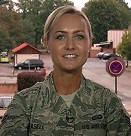 Airman Heasell: My name is Senior Airman Shabree Heasell from
USAFE, AFAfrica,
Ramstein Air Base, Germany.
Thank you so much for allowing me the opportunity to speak with you
today. Now, my question is in regards to compensation. We've been
hearing a lot on the news recently about possible changes to
compensation, such as retirement and housing allowance. Now, here in
Europe, we are focused on the mission, yet we can't help but be
curious how these changes may affect us. Sir, while we wait for more
information on the news, do you have any updates to these changes or
any advice for us and our families here in Europe?
Airman Heasell: My name is Senior Airman Shabree Heasell from
USAFE, AFAfrica,
Ramstein Air Base, Germany.
Thank you so much for allowing me the opportunity to speak with you
today. Now, my question is in regards to compensation. We've been
hearing a lot on the news recently about possible changes to
compensation, such as retirement and housing allowance. Now, here in
Europe, we are focused on the mission, yet we can't help but be
curious how these changes may affect us. Sir, while we wait for more
information on the news, do you have any updates to these changes or
any advice for us and our families here in Europe?
SecDef Carter: Yeah.
Airman Heasell: Thank you.
SecDef Carter: No, I...do. Thank you. Thank you for the question. Just in case everybody couldn't hear --
Airman Heasell: Thank you, sir.
SecDef Carter: -- it was about compensation, and I'll tell you the way I feel about -- there's a sense in which we can't pay you enough for what we ask you to do, and so that's kind of where I start with my -- my thinking. That said, we have a limited budget, and in addition to paying you more, I want to make sure you're fully trained. That costs money, too. And I want to make sure that you have the best equipment, and that takes money, too. And I want to make sure that there are enough of you, that we have enough soldiers, sailors, airmen and Marines so that when you look to your left and you look to your right, they're enough people there to carry us to victory.
So with a -- a budget -- and that's a whole other story -- don't even get me started on the budget -- the -- within a fixed budget, we need to balance those things. And so we -- that's the context in which we consider compensation. And -- But just to be clear, there's never -- the time I've been in the Defense Department, never a single discussion of cutting people's pay or -- or anything like that. What...we are talking about, and just to be realistic with you, is changing the rate at which pay is increased year by year. I don't like doing that but I'm trying to balance all the other things that make for an effective Force. So it's a reality I don't like, but it's a reality I need to manage, too.
You mentioned retirement -- I should say something about that. To me, the key thing is we're not going to change the game on you who are in now. The discussion is about whether an option is offered for the future to people who join after you, an option that you can avail yourself of too, but if you like the current system you can stay within the current system. I don't like bait and switch. In other words, when you're here and we made a deal with you, we're not going to change the deal with you on that basis. But the reason to look at the retirement has nothing -- it's really not money. It's...building flexibility in because we think people value flexibility in their careers, and they don't necessarily want to think in a block of 20 years. They may want to think in different blocks. So we want to give them that kind of discretion. So choice important; it's not the money thing. But for those of you in service today you should know that I -- I'm not going to change the game on anybody who signed up with a given understanding about retirement. That's the deal. The deal is not going to change.
Moderator Parry: All right. Well, thank you Airman Heasell for that question. We're going to go back out to Petty Officer Laurie Bent who's going to take us to the other side of the world in the Asia Pacific.
Moderator Bent: We do have a question from the Demilitarized Zone in Korea. Go ahead, state your name and your question.
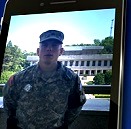 Private
First Class Sommers: My name is Private
First Class Jonathan Sommers. I'm an infantry man at the
Joint
Security Area, South Korea. Mr. Secretary, can you please explain
how you oversee U.S. operations in South Korea?
Private
First Class Sommers: My name is Private
First Class Jonathan Sommers. I'm an infantry man at the
Joint
Security Area, South Korea. Mr. Secretary, can you please explain
how you oversee U.S. operations in South Korea?
SecDef Carter: Well, where you're standing right now, I recognize full well, and for those who don't know he really is right at the DMZ. And I guess behind you, if I'm right, either in front of you or behind you, is the -- the border with North Korea, and Korea is one of those places that -- you know the expression out there, Jonathan "Fight tonight." This is one of these places that is a tinder box and we have to be ready every single day. We had a little dust up out there about a week ago and this is a place where, I mean, geeze, since 1953, American troops have been deterring North Korean aggression. I don't need to tell you about North Korean. It's, to put it mildly, an odd place and a threatening place.
And so if you say, "What are my" -- "What's my thought about the Korean peninsula?" Job one is fight tonight. We need to be ready. We need to make sure that the North Koreans always understand that any provocation with them will be dealt with and that they stand no chance of defeating us and our allies in South Korea. And sadly, even though it sounds like it's a...relic of the distant past, it's very much a part of today. So it's -- it's probably the single place on the world -- in the world where war could erupt at the snap of our fingers. That's why people like Jonathan have to be ready every minute, every morning.
Moderator Parry: Well, we thank Jonathan for that question. You too can ask your question of the Secretary. Just make sure you get on...onto Twitter. Use the hashtag asksecdef. Or again, you can go out to his Facebook page. Please, like the Secretary of Defense. It's facebook.com/secdef -- going to keep pushing that one out for you. But we do have a live audience of about 100 people here and we're going to try to take our first one, looks like from a soldier.
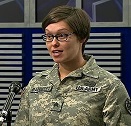 Sergeant Badgeley: Hi, good morning,
sir. I'm Sergeant Rachel Badgeley. I actually work here at the
Defense Media Activity, which afforded me the awesome opportunity to
ask you a question that's kind of close to me personally: maternity
leave. Sir, the
Navy has
recently increased their maternity leave, and there are rumors
that the
other services are talking about it. Is there any talk of the
DOD actually making a policy that would apply to all service
members, as well as DOD civilians?
Sergeant Badgeley: Hi, good morning,
sir. I'm Sergeant Rachel Badgeley. I actually work here at the
Defense Media Activity, which afforded me the awesome opportunity to
ask you a question that's kind of close to me personally: maternity
leave. Sir, the
Navy has
recently increased their maternity leave, and there are rumors
that the
other services are talking about it. Is there any talk of the
DOD actually making a policy that would apply to all service
members, as well as DOD civilians?
SecDef Carter: Yeah. No,2 there is. There is. And the -- the question, for those of you who didn't hear was about maternity leave. That's an important consideration, and we are going to march in lockstep. I'm waiting for the services to think about how they want to do that, and give me advice about how -- how to do it. But you know, this gets back to making family life compatible with military life. Many of you, most of you, are family people. I don't want you to have to choose between your family and serving us.
So, except where, you know, the...considerations of combat effectiveness require otherwise, we'd like to give you the -- the room to have your family because we want you to stay with us. One of the great things about having the very best is, I want you to stay, I don't want you to go. I wish you well if you choose to go, but I don't want you to have to go for the wrong reasons. And forcing you into a choice between your family and service is something I'd like to avoid where ever possible.
Sergeant Badgeley: Do you think it will be done by December, sir?
SecDef Carter: I...I'll -- I'll work on that.
Sergeant Badgeley: Thank you, sir.
SecDef Carter: I can understand the reason for the question. That's wonderful and congratulations.
Sergeant Badgeley: Thank you.
Moderator Parry: And thank you, Sergeant Badgeley, for that question. From our live studio audience here at the Defense Media Activity at Fort Meade, Maryland, we're going to go back out to Petty Officer Laurie Bent, for our next question, our next hot question from a cold place.
Moderator Bent: Cold, indeed. Secretary Carter, this place is only 28 degrees today. We have a question from Senior Airman [Taali] Ruffin. Senior Airman Ruffin, are you on the line?
Senior Airman Ruffin: Yes, ma'am.
Moderator Bent: Go ahead with your question.
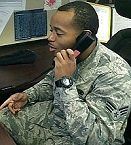 Senior
Airman Ruffin: Yes, good morning,
Mr. Secretary.
Senior
Airman Ruffin: Yes, good morning,
Mr. Secretary.
SecDef Carter: Morning.
Senior Airman Ruffin: My question is, with the continued advancements in the Air Force technology, what type of enhancements do you foresee into Thule strategic mission capabilities?
SecDef Carter: Yeah, Thule -- by the way, for those that don't know, is a radar site. It provides the critical capability to detect early if our country is under ballistic missile attack. We need to worry about that. We have -- The Russians have long range, nuclear armed ballistic missiles. China does. And unfortunately, North Korea probably will soon, may now, in some form; and of course, we're trying to head off the same thing in the case of Iran. So -- and this is the single gravest threat to our country, for the obvious reasons: Nuclear weapons do a -- a terrible amount of destruction.
So, your question is, what are we going to do? We have to upgrade those radars, keep those radars modern, keep their rear ward communications to our command centers, and to me, modern; make them more sensitive, so that they're able to detect threats earlier, that they're able to discriminate threats; where necessary, that they're able to cue our missile defenses, so that our missile defense interceptors can intercept them in flight. All these things require constant upgrades of a radar system. I -- I think we first put it there -- you may know the answer -- in the 1950s, or something. It's been there for a very long time; and you say, well why is it up there, and why are we asking him to be in such a cold place, which -- which, by the way, I appreciate your being there for us, because we count on it every day.
But the reason for that geography is, that that's one of the places that ballistic missiles overfly, or would overfly, if they were en route to the United States. So if you want to catch them early in fight, warn us back here, the President, myself, so we can make appropriate decisions and warn our missile defenses so we can intercept them in flight. You've got to have that...early warning information. And as radars get better and the computers that stand behind the radars get better and the communications that take the signals back to the United States get better, we have to continually upgrade them. So that's basically the future of Thule. It's not going anywhere because the...Earth's going to stay round, so we're going to need somebody like you up there.
Moderator Parry: Well, thank you, Airman Ruffin, and in that 28 degrees, I hope you are staying warm today. And this is the first ever Worldwide Troop Talk with the Secretary of Defense. As you see, we're talking to someone in Thule, Greenland but we also want you there watching at home to join us on Twitter. Use the hashtag asksecdef or you can e-mail asksecdef@mail.mil. He is standing by eagerly awaiting those next questions. In fact, we're going to go back out to Petty Officer Laurie Bent for our next one.
Moderator Bent: We are going to the Middle East this time. We have a question from Kuwait from Specialist Amber Stanley.
(Specialist Stanley: So what if I say like, what if I say like --)
Moderator Bent: Are you on the line? Can you hear us? Go ahead with your question.
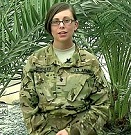 Specialist Stanley: Oh, yes I can. Hi.
Thank you for taking your time out to answer my question, Mr.
Secretary. My question is in regards to the
two soldiers that just
graduated from Ranger School, the female soldiers. How is this
going to affect the rest of, you know, female soldiers in combat
arms in their opportunities in that?
Specialist Stanley: Oh, yes I can. Hi.
Thank you for taking your time out to answer my question, Mr.
Secretary. My question is in regards to the
two soldiers that just
graduated from Ranger School, the female soldiers. How is this
going to affect the rest of, you know, female soldiers in combat
arms in their opportunities in that?
SecDef Carter: Great. Great, great, question and the first thing you've got to say is congratulations to these two. And I actually called them up and gave them congratulations. That's a big deal for anybody, male or female, to get through Ranger School, and so it's a huge achievement for them and I admire that again, in men or women. I think what you're asking is what...where are going with women in service in general and women in the combat arms; here's -- here's the -- the -- the situation right now.
First of all, you've got to -- where I come from is that what matters most is who -- who is qualified and can meet the standards, the rigorous standards of service. That's what matters. And I want to have the widest possible pool of people into which we can -- from which we can draw the force of the future, and that includes half of our population, which is women. So that's why I have the services looking at the relatively small, but significant number of MOS's [Military Occupational Specialty] that are still restricted to males and saying, you know, really think hard about that and tell me whether any restriction should be kept in the future, and if any, exactly why. What's the reasoning behind that?
And this affects, really, the Army and the Marine Corps.3 So asking our new Army Chief and our new Army -- our Marine Corps Commandant think hard about that. We have a deadline for them, which is to come back to me by the end of the year and I'll make a decision by -- by early next year. But the principle's clear, which is we...want to draw from the largest population of qualified people who can meet the standards.
These two people clearly meet the standards of Ranger School and they just -- it was great to talk to them. I mean their -- their principle thing on their mind was getting a little rest and -- so I'm sure they were happy to talk to me, but mostly getting rest seemed to be on their mind. But huge achievement to them, kudos to them.
Moderator Parry: All right. Well, we thank you for that question, from Kuwait, certainly enjoying some warmer weather than our other guest out in Thule. And we want you, here at the audience, to be asking your questions here shortly. But you can join us as well on Twitter, just use the hashtag asksecdef, or you can e-mail us, asksecdef@mail.mil. We're going to head back out to our very hard working social media team, with Petty Officer Bent, for our next question.
Moderator Bent: We're actually going to go back to social media for this question, and this is coming from Twitter from iphoneque. The question is, "Secretary Carter, any plans to fix diversity within the DOD?"
SecDef Carter: Same -- Same basic point as -- as the idea of women in service, which is that we want to draw on the entire population of the United States, and be able to pick the very best who can meet our standards to serve. That's what the all-volunteer Force is all about. So, we do need to ask ourselves the question of underlying diversity, is, "Are we fully availing ourselves of people of all kinds, or are there any hidden ways in which we're not doing that properly?" And it's important at all ranks, because we all know we look up to people, right? And...it's...nice to be able to look up to a leader who looks like you.
And so, it's important not only that we draw from the population, full population appropriately, but also that we make sure that we don't have any hidden biases in the way we promote people. So that there are senior leaders of all kinds, that all kinds of troops can look up to. So it's an important issue, and obviously, there's a legacy of history here, for our country, and for people in general. And you know, we're all about -- the thing I'm incredibly proud about, about being part of this wonderful department, is it's a learning place.
We're always looking to learn how to do better. We learned how to do COIN. Who thought we'd be doing that? We spent a lot of time, we got really, really good at it. When we're presented a challenge, we take it on, we learn about it. So diversity is something we're going to -- we're -- we're taking on, we're going to learn about it. Because there's a -- there's a huge benefit to it, which is, people who otherwise wouldn't be part of our force, whom we need, who are good, who are excellent.
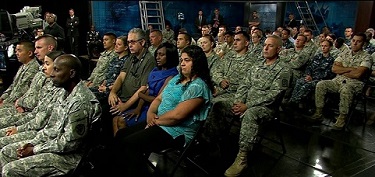
Moderator Parry: Well, you can certainly see some of the diversity we have here at the Defense Media Activity Studios at Fort Meade, Maryland, with our studio audience of about 100 people. We want you to join this conversation, though, online as well. Just go out to his Facebook page, Facebook.com/secdef, and there you can ask your -- ask the secretary a question.
SecDef Carter: Yeah, do.
Moderator Parry: We're going to head back out to Petty Officer Bent, who is going to take us a little closer to her neck of the words.
Moderator Bent: That's right, we're headed to the Caribbean, where we're going to hear from, secretary, the sailor of the year,4 down in Guantanamo Bay, Cuba, Petty Officer James Sorrentino. Petty Officer Sorrentino, can you hear us?
Petty Officer Sorrentino: I can hear you, loud and clear.
Moderator Bent: Go ahead with your question.
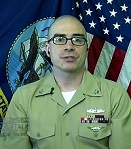 Petty Officer Sorrentino: Good morning, Mr.
Secretary. My name is YN2 James Sorrentino, from
U.S. Naval Station
Guantanamo Bay. My question to you, sir,
is
the CNO
visited us last year, and I'm kind of interested in what
the current administration's new plans are and -- for the future of the
installation.
Petty Officer Sorrentino: Good morning, Mr.
Secretary. My name is YN2 James Sorrentino, from
U.S. Naval Station
Guantanamo Bay. My question to you, sir,
is
the CNO
visited us last year, and I'm kind of interested in what
the current administration's new plans are and -- for the future of the
installation.
SecDef Carter: Okay, first of all, congratulations -- very, very proud of you. That is a huge honor, and that's wonderful, and appreciate you being down there. And there are two parts, I think, to your question. First of all, Guantanamo Bay is a military installation that is strategically located, that we have been operating for a long time, and that's going to stay important, and I don't see us changing that. We -- it's also where we have detained, after 9/11, people who were determined to hurt our country and harm our people. So there they are.
Now, my view is that it would -- it would be good, if possible, to close Guantanamo Bay, if it can be done safely. And the reason I say that is that it...ends up being part of jihadi recruiting and so forth, and I'd just as soon not leave that to future presidents. Now, why is it tricky to do that? The...reason it's tricky to do that is this: Some of the people who are there at Guantanamo Bay it -- have to be detained indefinitely, okay? They just gotta be locked up. So if they're not locked up in Guantanamo Bay, they need to be locked up somewhere. So we are looking at places in the United States -- prisons and other places -- to which these people can be moved.
There are some, maybe half or so, of the population of Guantanamo Bay that, under conditions that are safe, that is, where we can mitigate the risk that they'll ever return to the battlefield, we may be able to transfer them to some other country. But there's another roughly half of them that are not safe to release, period. So they need to be detained somewhere. [If] they're detained at Guantanamo, fine. I would prefer to find a different place for them, and right now we're working with the Congress, because the Congress has to agree to this, because [there are laws restricting what we do through -- with respect to Guantanamo Bay.] 5
So we'll try to come up with a plan and...work with Congress to see if we can do that or not. It would be a -- It would be a nice thing to do and an important thing to do if we -- if we can do it. But we gotta be realistic about the people who are in Guantanamo Bay. They're there for a reason.
[audio-to-text transcription verified to here: 27:19]
Moderator Parry: All right, well, thank you, Petty Officer Sorrentino for that question. We hope that you and the rest at Guantanamo Bay stay safe during this storm season. If you have a question for the SecDef and it doesn't get answered today, go ahead and head out to defense.gov. There, you find all of your Department of Defense top news stories, print stories and video stories, one of those being actually the Asia-Pacific rebalance, where Petty Officer Laurie Bent is going to take us out to next.
Moderator Bent: While I was stationed in Sasebo, Japan, I had the opportunity to visit Okinawa, Japan, where our next question is coming from. We have a cell phone video question. Who am I speaking with?
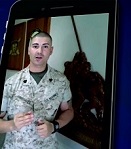 Sergeant Rodriguez: Hi, my name is
Sergeant Angel Rodriguez,
4th Marine Regiment, Camp Schwab, Okinawa,
Japan. Mr. Secretary, will we
see more of a permanent personnel based in
Darwin, Australia, with
Marines, of course, and if so, how would this fit in the rebalance
of the Asia-Pacific?
Sergeant Rodriguez: Hi, my name is
Sergeant Angel Rodriguez,
4th Marine Regiment, Camp Schwab, Okinawa,
Japan. Mr. Secretary, will we
see more of a permanent personnel based in
Darwin, Australia, with
Marines, of course, and if so, how would this fit in the rebalance
of the Asia-Pacific?
SecDef Carter: The question was, will we see more permanent presence in Darwin, Australia. Just to catch everybody, for those who don't follow this, we now have a rotational presence in Darwin, Australia, and for now, to answer the question, that's our plan. It's seasonal. It works well for the Australians. It works well for our Marines. We're always open to different ways of deploying people, particularly in the Asia-Pacific, because it's worth saying, why is the Asia-Pacific so important? Think about this.
The Asia-Pacific theater, it's not in the news all the time, right, like the Middle East is, so you tend to set it aside in your mind. But you gotta remember, that's where half of humankind lives and half of the economy and the world is. So it's hugely important to America's future that we remain what we've been for 70 years, which is the linchpin of peace and prosperity in that part of the world.
That's why having Marines in Australia's so important. Australia's a great ally, and you're talking to us from Japan, another great ally. There's a message in there. We have all the friends and allies there. Why do we have so many friends and allies? Sometimes, you know, we complain, we wish they'd do more, they depend too much on us and, you know, the usual complaints that we make. But there's a lesson in there. People like working with Americans, because they like what we stand for. It's not just that we're strong; it's the values we bring, and they feel like we work with them, we don't push them around, we take their interests into account, we stand for things like freedom that matter to people.
So we have all the friends and allies out there, and it's a huge strength. So that, together with our own military presence there, is what I think can keep the peace in the Asia-Pacific. And boy, if that ever were to be eroded the way you see things in the Middle East, it would have much more consequences for the -- for our security and our people and our future than any other region in the world simply because it's where half of the people live and half of the economic activity is.
Moderator Parry: Well, thank you, Sergeant Rodriguez. And I know you were asking for the Marines specifically, but I know personally I hope that there's some chances for the airmen as well to get to that land "down under." We're going to head back out --
SecDef Carter: It's a beautiful place.
Moderator Parry: We're going to head back out to our social media team where Petty Officer Bent has our next question.
Moderator Bent: So we've heard from Twitter and Facebook, so we're going to go to e-mail. We have an e-mail from Nick Cobretti. His question is, "Is America going to put boots on the ground to pound ISIS?"
SecDef Carter: Well, we're certainly going to pound ISIS, and then the -- the boots on the ground part is under what conditions and in what manner would we -- are we using force there. And you need to begin with what it takes to defeat ISIL. Let me put it this way. We could defeat ISIL -- the U.S. military could defeat ISIL. That's not the trick. The trick is to defeat ISIL in a lasting way, and that means that after they're defeated, they need to stay defeated, which means that there need to be local forces representing the local people who keep the kind of extremists that ISIL represents from taking over again. So what we're -- so our strategic approach to the ISIL defeat is to enable capable and motivated ground forces that are local and can keep the peace after we've helped them win the peace.
Now, we will enable them. We're enabling them from the ground, I mean, from the air. We're enabling them with training, and we've indicated that if we have capable and motivated ground forces -- and there's some specific kind of enablement by U.S. forces that will help them get that victory, we're willing to consider that. But you have to start with the fact that you can't defeat ISIL from the outside in, there has to be an inside out aspect to it. Otherwise, it won't stick, right, and we'll be back there in five years, back there in 10 years, back there in 15 years. So we're looking for a lasting defeat.
And the last thing I'll say is I'm confident we'll do it. This is civilization against barbarity, it's the many against the few. We will win, but we want to win in a way that sticks, and that means doing the laborious job of training and equipping locals who are motivated to fight these guys, win back their homes and then run a decent place for their people so that there -- it isn't a breeding ground for this kind of extremism. That's why it's going to take some time and that's why it's -- that has to be our strategic approach. And it will be.
Moderator Parry: All right. Well, that was an excellent question from Nick Cobretti on e-mail. And if you want to find out more about what our service members are doing in Inherent Resolve and over in Afghanistan, head out to defense.gov. There you have all the top Department of Defense stories, video stories and print stories to include what we're doing to thwart ISIL. We're going to head back out to our social media team where Petty Officer Laurie Bent has our next question.
Moderator Bent: We are headed back online to Twitter. We have a question from MitchTC_34. The question is, "At what point do you decide if a threat deserves U.S. interaction or help? What factors must be considered?"
SecDef Carter: Well, number one is, are American interests involved? There are lots of problems around the world. Of course we'd like to help people solve all problems, but we can't do everything.
So you have to start with the basics, which is what do we need to do to protect our own people and our own interests and our own friends. So it has to start there, and then you have to ask yourself is the military instrument the right one and in most cases where the military instrument is essential, it's not the only one.
Let's go back to the ISIL fight. I talked about defeating them on the ground in Syria and Iraq, and we will do that with these local ground forces once they are developed and get capable and get motivated, but there's more to the ISIL fight than that. There's a online fight because these guys are recruiting people, including Americans, with their bizarre propaganda. There's a homeland security and border control issue to stop foreign fighters from going back and forth. There is, as always there is in these kind of things, an economic aspect to the fight
So it's a wide-ranging kind of thing. We play a role an absolutely indispensable role in the lasting defeat of ISIL, but we're not the whole package. And that's why we need our colleagues in the State Department, the intelligence community, Homeland Security, law enforcement and all that to be in the game as well because you can't entirely play an away game, here. You have to play a global zone defense in a globalized world and that's what these guys are taking advantage of, the fact that we're all connected and trying to use that as leverage. We need to combat them on the terrain that they're on.
Moderator Parry: Our social media team sure has bee busy and we're going to head back out to Petty Officer Bent who has our next online question.
Moderator Bent: We are going to Facebook where we have a question from Zebulon Carlander. He's asking, "As you have a doctorate in physics, I'm curious to know what technological trends and developments excite you the most."
SecDef Carter: Good question. You're right; that is my background. And the honest answer is that -- and this isn't just because technology is exciting me -- there are several different things going on and I -- everybody focuses on tech, right? Cyber and what's happening in social media, connectedness, and so that's an incredibly important frontier because our planes, ships and tanks, in order to function effectively, require networking and it's that combination that makes our force effective.
So that's obviously an important one. Just to tell you a few other things we've been doing. We're looking at hypersonics, things that fly fast than sound. We're looking at biotech and this is important, because the biotech revolution is, I think, going to be even more consequential than the information revolution. It's going to make a very big difference and like all other technological revolutions, it can be used for good or for ill.
We want to make sure it's used for good and we want to make sure that we're the best at combating any use of it for ill. And so we need to be on top of all of these scientific frontiers, as our country has been for decades and decades now.
And the last thing I'll say about that is, you know, we don't do -- I'm always careful to tell people we don't build anything in the Pentagon. You don't go into the Pentagon and they're putting together airplanes or putting together information systems, right? We get our stuff from industry; that's the American system. The Soviet Union tried the other way around, which is have the government do everything; didn't work out very well for them.
So our system is to use as a diving board, as a springboard, the vibrant technology base that's out there in companies, venture capital and so forth. And in order for us to be the best, therefore, we need to be the best at interacting with that technology base and drawing that which is military-relevant -- militarily relevant from that technology base into our particular sets of application.
That's critical to keeping the edge, because just to go back to the beginning, next to superb people, the thing that makes us the greatest fighting force the world has ever known is the technology, and America's been a leader in that needs to be in the future and our military needs to be the “firstest” with the “mostest” in new technology in every field -- biotech, cyber, hypersonics, you name it.
Moderator Parry: In this first Worldwide Troop Talk, we've gone everywhere from Europe to the Asia-Pacific. We've even asked several questions online, but we can't forget our studio audience of about 100 people here, where we're going to go to for our next question from a young Marine.
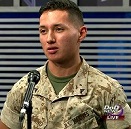 Lance Corporal Deleano: Good morning, sir.
I am Lance Corporal Robert Deleano. I got sent here to -- go to DINFOS to pick up the
[inaudible] class. And my question is, do
you think the defense budget is the main cause for this country's
financial struggles, or do you believe the defense budget should
take more priority than other stuff to spend on?
Lance Corporal Deleano: Good morning, sir.
I am Lance Corporal Robert Deleano. I got sent here to -- go to DINFOS to pick up the
[inaudible] class. And my question is, do
you think the defense budget is the main cause for this country's
financial struggles, or do you believe the defense budget should
take more priority than other stuff to spend on?
SecDef Carter: No, it's not the cause, and this is really -- you're -- you're on to something that's really important that really gets me exercised. The economic future of the country depends upon three things. Running the government depends upon three things. People focus on the defense budget, or they focus on discretionary spending, but that's mostly because people don't like to focus on revenues, taxes, and they don't like to focus on entitlements.
And in particular, there's partisan gridlock on those questions so that they end up going after the discretionary budget, not just our budget, but other parts of the government. I already said other parts of the government matter to us, right? Law enforcement, FBI matters to us, intelligence community matters to us, so it's not all us.
But it's a mistake to think that you're going to fix the country's deficit problems by going after the defense budget. So I -- that's just fundamentally wrong, and it's not a reflection of logic, it's a reflection of gridlock in Washington.
We've had it now for several years running, and it's unfair to you, because it adds uncertainty to an environment that's already difficult enough for you. It is difficult for me to manage our investments and our future if we never know what budget we're going to get and when we're going to get it. It's embarrassing around the world. The rest of the world looks at us, "Can't you guys get your act together"? It's not reflective of a great nation.
So you can't fix the country's deficit problems on the backs of the Department of Defense or on the backs of the federal budget. Just do the math. It doesn't work.
So people need -- we need to rise above this and come together behind an overall approach to deficit reduction, and the discretionary part of the budget just isn't enough. And you can keep raiding it and keep raiding it, and all you do is undermine the important public functions, of which national security is the most sacred. So, I have nothing good to say about it, and there's no reason for it but gridlock in Washington.
Lance Corporal Deleano: Thank you, sir.
Moderator Parry: That's a great question from our young lance corporal here at the studios of Fort Meade, Maryland, at the Defense Media Activity. But we're going to go back online, where Petty Officer Bent has our next question.
Moderator Bent: We're going to pull our next question from Twitter. We have a question from bpeterman007, "How do we sustain global commitments with fewer personnel? For example, not overextending remaining forces."
SecDef Carter: Yeah, well, it's a good question, because for a decade and a half, we were deploying people at a rate that is just not sustainable. It's not compatible with family life, it's a lot of wear and tear on service members and their families. And so, it is important to slow down that OPTEMPO. I think one of the lessons of that is, with our commitments, ground commitments in Iraq and Afghanistan much smaller than they've been over the last decade and a half, we're able to bring more service members home, so that they can be with their families, so they can do that full spectrum training that's important for future threats.
I don't think any enemy should measure American power by what's there on a day to day basis, right in front of their eyes. Remember, if you pick a fight with the United States you're going to have this enormous tidal wave of the U.S. military wash over you. It will come from all corners of globe; it will come from the United States, and that will be the end of you. So, we don't have to be present. It's important to be present where it helps you all to learn your skills, and the theater to which you might -- in which you might be employed. It helps us when we cross train, Australia was mentioned earlier, with good allies, because good allies are a force multiplier; it means we don't have to do everything ourselves, so it's important to train with them.
But you shouldn't measure the might of the American military by what is deployed at any given moment. You measure its might by the potential in the whole, which includes the whole force that's in the United States, and those are people who are training, training hard, training realistically, training intensively, but also getting to be with their families and doing everything else, see their kids. Everything that is necessary, if we're going to keep the very best with us.
Moderator Parry: All right, well, our social media team has been busy and hard at work for us here today. And they have our next question. Petty Officer Bent?
Moderator Bent: Our next question comes from the e-mail of Secretary Carter. Marine Corps Staff Sergeant Antonio Ferguson is asking, "Looking at everything that is taking place in society with various threats against us, do you feel that we needed to tighten up on security aboard military bases, and try to prevent incidents happening?"
SecDef Carter: Yeah, well, force protection has to be our highest priority. Unfortunately, in today's world, we have to think about that at home as well as overseas. It's a connected world. I was in Chattanooga, Saturday before last, very sad event involving a recruiting center and a nearby installation. And so, we have tightened up security, and we're going to need to, and we're looking at doing more. And of course, the question of arming people comes up, and there are regulations now, that permit arming people under certain conditions -- [inaudible] -- the appropriate training and so forth.
But we need to -- and we're looking at ways that that can be adjusted and changed, and all kinds of other ways of hardening our installations against these lone wolves and sort of losers who have been online too much and so forth. We need to protect ourselves, we need to protect our families from them. At the same time, we want to stay close to our society right, whether they'll be able to get off-post, on-post, see friends, we want to be able to recruit.
Recruiting centers are out there for a reason. I visited a recruiting center the other week in a mall. Some are in Times Square, some are in more rural areas, and then of course, we have our installations, which come in all different sizes, shapes and geography. So we have to shape our force protection, obviously, to the situation, as the experts in security understand. But we do need to take it seriously in today's world, and force protection at home and abroad is job one for all of us.
Moderator Parry: Well sir, we're going to take it out to social media one more time for a fun question with Petty Officer Bent.
Moderator Bent: Secretary Carter, we have a Twitter question for you from Boy12Boston. And this question is who is your favorite U.S. President?
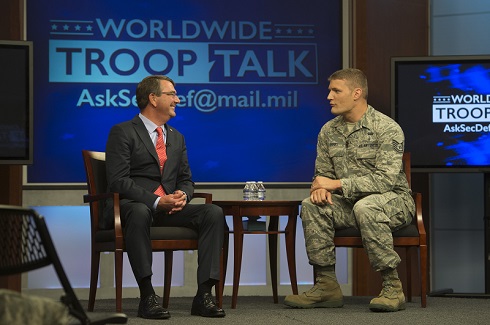
SecDef Carter: Of course, you're supposed to say the guy who hired you, right? But with due regard to that, I -- you've got to say George Washington because he was a soldier, statesman and somebody who knew how to build something and look to the future. And, you know, we look back now a very, very long time ago, and look at what this individual -- without him, I think all the people who wrote at the time and tell us what things were like at the time say there wouldn't be any United States of America without him. He pulled people together and gave them a vision of this great, great country unlike any other country in history at the time and, for that matter, since.
You know, a great, open democracy, and that wouldn't have happened without him. And I like to think that it's in part the fact that he was a soldier at heart and in start that gave him the, you know, depth of understanding and the courage and the vision to be what he was. So to me, he's hand -- and we've had lots of good presidents, but hands-down, we wouldn't all be here, we wouldn't have what we have without George Washington.
Moderator Parry: Well, excellent response, sir. And I know that you're going to be heading up to Baltimore here after joining us. I want to thank our audience members, those joining us worldwide, and of course, our social media team. And you sir, do you have any lasting remarks here for our audience and worldwide?
SecDef Carter: Just I'm so proud of you. It is a privilege to be part of this great institution. What you are, what you stand for, I'm just so proud of you and our country's so proud of you. And I just want you to know you're in my and Stephanie's hearts every minute of every day. You're what we wake up for, it's what -- you're what we think about all day. Completely committed to you and so deeply grateful, as this whole country is, for what you do to protect our people and make a better world for our children. So thank you.
Moderator Parry: Well, thank you. Our Secretary of Defense, ladies and gentlemen. Thank you for joining us.
1 A reference to Facebook's "Like Button", "a feature...[allowing] a user [to] express that they like, enjoy or support certain content. Internet services that feature like buttons usually display the number of users who liked each content, and may show a full or partial list of them." (Wikipedia.org) It is not clear, given his nonverbal reaction, whether Secretary Carter immediately understood this situated use of "like."
2 Ad hoc. See Professor Mark Lieberman's (University of Pennsylvania) linguistic analysis of the "Yeah-No-(Yeah)" expression.
3 See, for example, executive summary of Marine Corps Force-Integration Plan Study; see also, foregoing study overview (including rationale, justification and design).
4 Apparent misstatement. The 2015 Sailor of the Year Honorees can be found here.
5 Transmission interrupted briefly at this point in the audio appearing above. However, the content appearing in red brackets ["There are laws restricting what we do through -- with respect to Guantanamo Bay"] has been verified as delivered.
See also: President Barack Obama's Worldwide Troop Talk
Text Source: defense.gov
Audio Source: dvidshub.net
Images (Screenshots) Source: dvidshub.net; Note: Main (first) image taken by Senior Master Sgt. Adrian Cadiz.
Page Updated: 12/14/23
U.S. Copyright Status: Text, Audio, Images = Public domain.
